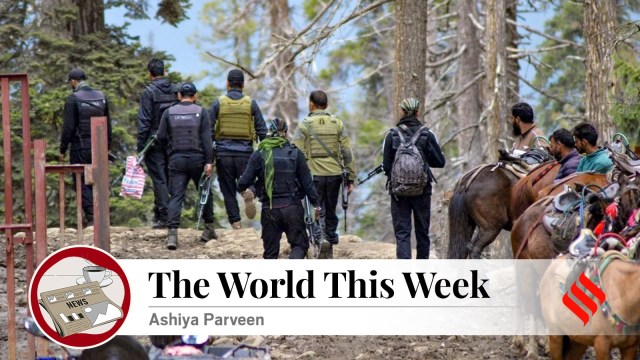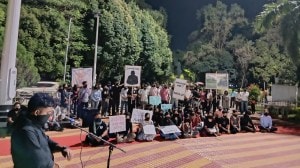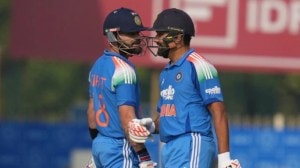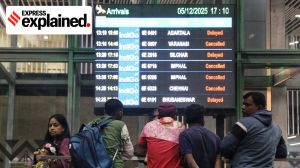
In its strongest diplomatic pushback, India on Wednesday announced a raft of measures in view of “the cross-border linkages of the terrorist attack” and
— Suspended the 1960 Indus Waters Treaty – a pact that has survived four wars, crises, and decades of tension between the two nations;
— Cancelled all SAARC Visa Exemption Scheme (SVES) visas issued to Pakistani nationals and gave them 48 hours to leave;
— Closed the Attari-Wagah border and said those who have crossed over with valid endorsements may return through that route before May 1, 2025;
— Expelled diplomats and top defence officials from the Pakistan High Commission in Delhi, bringing down the overall strength of the High Commissions from the present 55 to 30.
Story continues below this ad
These measures, the strongest since the abrogation of Article 370 in 2019, were announced after the meeting of the Cabinet Committee on Security (CCS) chaired by Prime Minister Narendra Modi, who had to cut short his visit to Saudi Arabia.
Although Pakistan claimed that it had “nothing to do with it [Pahalgam terror attack]”, Indian officials remained unconvinced as initial investigations suggested the presence of “foreign nationals” among the attackers. The Pahalgam attack is also the deadliest terror attack on civilians in India, since the 26/11 Mumbai terror attack.
The Prime Minister reiterated India’s resolve to take strict action saying, “…India will identify, track, and punish every terrorist and their backers. We will pursue them to the ends of the Earth. India’s spirit will never be broken by terrorism.” Sources said India is looking at all strategic and security options now.
Following India’s diplomatic pushback, Pakistan responded by halting trade, closing its airspace to Indian carriers, and warning that any move to divert Indus waters would be seen as an “act of war.” It has also reduced diplomatic presence and shut down the Wagah post.
Story continues below this ad
The tit-for-tat retaliations raised fears of further escalation, prompting the UN Secretary-General Antonio Guterres to urge the two nuclear-powered nations to exercise “maximum restraint”.
The Secretary-General “very much” appeals to both the governments of India and Pakistan to “exercise maximum restraint and to ensure that the situation and the developments we’ve seen do not deteriorate any further,” his spokesman Stephane Dujarric said at the daily press briefing on Thursday.
India, Saudi Arabia condemn terrorism, deepen strategic ties
Saudi Arabia’s Crown Prince Mohammed bin Salman, referred to as MBS, and Prime Minister Narendra Modi on Wednesday condemned “cross-border terrorism” and called on all States to reject the use of terrorism against other countries, dismantle terrorism infrastructure, and bring perpetrators of terrorism to justice swiftly.
The strong condemnation was part of the joint statement issued after the Prime Minister’s visit to Saudi Arabia. PM Modi reached Jeddah on Tuesday for a two-day visit at the invitation of MBS but returned on Wednesday morning, instead of that night, because of the attack.
Story continues below this ad
“Both sides strongly condemned the gruesome terror attack in Pahalgam, Jammu and Kashmir on 22 April 2025, which claimed the lives of innocent civilians…the two sides condemned terrorism and violent extremism in all its forms and manifestations, and emphasised that this remains one of the gravest threats to humanity,” the joint statement said.
The two leaders also held constructive discussions and noted that the solid foundation of the bilateral relationship between the two nations has further strengthened through the strategic partnership covering diverse areas including energy, trade, investment, expatriate, Haj, defense, security, counter-terrorism, technology, climate change, agriculture, culture, health, and connectivity.
PM Modi, in an interview with Arab News, described the kingdom as “a trusted friend and strategic ally,” emphasising how bilateral relations had expanded significantly since the creation of the Strategic Partnership Council in 2019.
Modi and MBS appreciated the deepening of the defence ties as a key pillar of the strategic partnership. They co-chaired the second meeting of the India-Saudi Arabia Strategic Partnership Council and welcomed its expansion from two to four Ministerial Committees by the addition of the Ministerial Committees on Defence Cooperation, and Tourism and Cultural Cooperation.
Story continues below this ad
“They noted with satisfaction the growth of their joint defence cooperation including numerous ‘firsts; like the first ever Land Forces exercise ‘Sada Tanseeq’, two rounds of the Naval exercises ‘Al Mohed Al Hindi’, many high-level visits, and training exchanges, towards ensuring the security and stability of the region,” the joint statement said.
The two sides affirmed their full support for the international and regional efforts aimed at reaching a comprehensive political solution to the crisis in Yemen. On the India-Middle East-Europe Economic Corridor (IMEEC), launched during the G20 Summit in September 2023, PM Modi said the project would be “a key catalyst of commerce, connectivity and growth in the entire region.”
“Significant progress” in India-US trade pact, China tariff to “come down”
Against the backdrop of the trade war unleashed by US President Donald Trump, this week witnessed developments that signalled apparently positive shifts and brought some relief to markets. India and the US “welcomed the significant progress” in their trade pact, while Trump said the high tariffs on China will “come down substantially”.
Story continues below this ad
US Vice-President J D Vance, who was on a four-day visit to India, met Prime Minister Modi on Monday and both sides “welcomed the significant progress” in negotiations towards a US-India Bilateral Trade Agreement (BTA) that is expected to address a range of issues, including tariff and market access.
The two sides formally announced that the terms of reference, which outline the framework of the BTA, had been finalised, laying down a roadmap for further discussions about shared economic priorities between the two countries. Enhancing cooperation in energy, defence, strategic technologies and other areas also featured during the meeting.
Vance’s visit also provided an opportunity to review the progress achieved in bilateral relations and the implementation of the outcomes of the India-US Joint Statement issued on 13 February 2025 after the Modi-Trump meeting in the US.
However, as India and the US noted progress in trade negotiations, China warned countries against entering into trade agreements with Washington at its expense in order to get exemptions from Trump’s tariff regime.
Story continues below this ad
“China firmly opposes any party reaching a deal at the expense of China’s interests. If this happens, China will not accept it and will resolutely take reciprocal countermeasures,” the Chinese Ministry of Commerce said in a statement.
Nonetheless, both the US and China are seeking to forge trade deals with nations within their respective spheres of influence. While the US is negotiating agreements with India, Japan, and South Korea, China is pushing ahead with deals involving Vietnam, Malaysia, and Cambodia.
Meanwhile, Trump signalled a “substantial” lowering of tariffs on China. He acknowledged that the 145% tariff on China was a “very high” level, and that this would “come down substantially”.
“They will not be anywhere near that number,” but “it won’t be zero,” the President said. “Ultimately, they have to make a deal because otherwise, they’re not going to be able to deal in the United States.”
Story continues below this ad
As Trump hinted at a thaw in the trade war, the US stock market gave a green signal as the S&P 500 stock index rose 2.5 per cent. However, China refuted the US claim that the two countries are engaged in tariff negotiations.
Trump told TIME magazine that talks were underway with China and that Chinese President Xi Jinping had called him. But Beijing brushed aside the claim, saying, “China and the US are NOT having any consultation or negotiation on #tariffs,” and added, “the US should stop creating confusion.”
Trump has imposed a 145 per cent tariff on Chinese goods and up to 245 per cent on some Chinese products. China has retaliated by increasing tariffs on American products to 120 per cent. On April 2, Trump announced his reciprocal tariffs on all its global trading partners. However, as the global market nosedived, he placed it under moratorium for 90 days.
 The coffin of Pope Francis is carried into St Peter’s Square for his funeral, at the Vatican. (AP Photo)
The coffin of Pope Francis is carried into St Peter’s Square for his funeral, at the Vatican. (AP Photo)
World leaders in Rome for Pope’s funeral
This week also marked a profound period of mourning over the death of Pope Francis who died Monday after suffering a stroke, just a day after his surprise public appearance on Easter Sunday where he greeted a crowd of more than 35,000 in St Peter’s Square.
The body of the 88-year-old pope was brought to St Peter’s in a solemn procession on Wednesday. Since then, about 250,000 people from all over the world have paid their last respects to the pontiff over three days of public viewing, the Vatican said.
At least 130 foreign delegations had confirmed their attendance at Pope Francis’s funeral on Saturday, including about 50 heads of state and 10 reigning monarchs, according to the Vatican.
President Droupadi Murmu, US President Donald Trump, Argentine President Javier Milei, French President Emmanuel Macron, Brazilian President Luiz Inacio Lula da Silva, outgoing German Chancellor Olaf Scholz, and Ukrainian President Volodymyr Zelenskyy, are among the dignitaries attending the funeral.
Francis, the first Latin American to lead the Roman Catholic Church, was elected as the supreme pontiff on March 13, 2013. During his 12-year-long reign, Pope Francis stood by the outcast and the marginalised and emerged as one of the strongest moral voices of the time.
He constantly called for peace and spoke up for people living amid violence and conflict, from Ukraine and South Sudan to Gaza. In his final Easter address on Sunday (April 20, 2025), he called for a ceasefire between Israel and Hamas.
Since the beginning of the Gaza war in October 2023, Pope Francis called the lone Catholic Church in Gaza every day to know how people sheltering at the church were coping with the war.
Gaza pushed towards abyss, US, Iran hold nuclear talks
Nonetheless, Israel’s devastating war on Gaza continued to push the tiny strip towards an abyss with the UN’s World Food Program saying its food stocks in the Gaza Strip have run out because of Israel’s nearly 8-week-old blockade.
Some 80% of Gaza’s population of more than 2 million relies primarily on charity kitchens for food, because other sources have shut down under Israel’s blockade, according to the UN. The WFP has been supporting 47 kitchens that distribute 644,000 hot meals a day, WFP spokesperson Abeer Etefa told The Associated Press.
Israel resumed its relentless bombing in Gaza in March, shattering the ceasefire it entered with Hamas in January this year. It says the moves aim to pressure Hamas to release hostages it still holds.
At least 51,439 Palestinians have been confirmed killed and 117,416 wounded in Israel’s war on Gaza since it began 18 months ago, Al Jazeera reported.
Amid this, the resumption of Iran-US nuclear talks offered a silver lining in the region embroiled in conflicts, wars and political instability.
Iran’s Foreign Minister Abbas Araqchi and Trump’s Middle East Envoy Steve Witkoff held the third round of talks in Oman’s capital, Muscat, today, a week after a second round in Rome that both sides described as constructive.
Talks were held at expert level, which aims at ironing out the details and wording of a potential nuclear deal.
“The negotiations are extremely serious and technical … there are still differences, both on major issues and details,” Araghchi told Iranian state TV. “There is seriousness and determination on both sides … However, our optimism about the success of the talks remains extremely cautious.”
A senior US administration official described the talks as positive and productive, adding that both sides agreed to meet again in Europe “soon”. “There is still much to do, but further progress was made on getting to a deal,” Al Jazeera cited the official as saying.
Earlier, Omani Foreign Minister Badr Albusaidi said talks would continue next week, with another “high-level meeting” provisionally scheduled for May 3.
US: Russia, Ukraine very close to deal
Following a meeting between US Special Envoy Steve Witkoff and Russian President Vladimir Putin in Moscow on Friday, President Trump called for the two sides to meet for “very high level talks”, saying they are “very close to a deal” on ending the three-year war.
“They are very close to a deal, and the two sides should now meet, at very high levels, to ‘finish it off,’” Trump wrote on his Truth Social site. “Most of the major points are agreed to Stop the bloodshed, NOW. We will be wherever is necessary to help facilitate the END to this cruel and senseless war!”
Of late, Trump has been stepping up pressure on Russia and Ukraine to end the war. Last week, he warned of quitting the peace efforts if no progress is made in a “matter of days”.
Trump also put pressure on Ukraine to “IMMEDIATELY” sign an agreement giving the US access to Ukraine’s mineral wealth. On Friday, he said that “Crimea will stay with Russia”. Russia seized Crimea in February 2014.
Send your feedback and ideas to ashiya.parveen@indianexpress.com.



 The coffin of Pope Francis is carried into St Peter’s Square for his funeral, at the Vatican. (AP Photo)
The coffin of Pope Francis is carried into St Peter’s Square for his funeral, at the Vatican. (AP Photo)






























